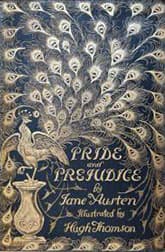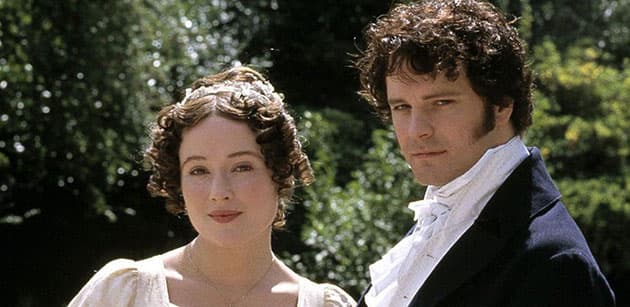Pride and Prejudice
Critique • Quotes • Text • At the movies
 1894 first Peacock edition
1894 first Peacock editionFirst publication
1813
Literature form
Novel
Genres
Literary, romance
Writing language
English
Author's country
England
Length
Approx. 121,000 words

Jennifer Ehle and Colin Firth overcome pride and prejudice to find love in sensual miniseries.
The sexy Pride and prejudice
Pride and Prejudice (1995): Television miniseries, 327 minutes in six episodes; director Simon Langton; writer Andrew Davies; featuring Jennifer Ehle, Colin Firth, Susannah Harker, Adrian Lukis, Benjamin Whitrow, Alison Steadman, Julia Sawalha
For many, the 1995 BBC miniseries of Pride and Prejudice is most noteworthy as the production that brought us Colin Firth. His smouldering, arrogant presence as Mr. Darcy haunts the first part of the series before he turns into the noble, romantic figure of the end. The role made him a star and a romantic lead in many a film to come—and eventually an Oscar-winning actor.
This production is also known as the one that manages to update Jane Austen, making her more relevant to a modern audience, while staying true to the author's original story set among the gentility of early eighteenth-century England. The six hour-long episodes established themselves as presenting the definitive version of Pride and Prejudice.
Part of the updating of Austen is inevitably the sexualization of the story. The added scene of Darcy/Firth emerging from a lake with his wet shirt clinging to his body has become so famous that the actor has parodied it in subsequent films. But a sensual undertone continues throughout the relationship of Elizabeth Bennet (Jennifer Ehle) and Darcy.
The famous lake scene in the 1995 serial of Pride and Prejudice.
Austen's great theme is that marriage should be based on love, and love is founded on mutual admiration and shared moral values. Sexual attraction—or plain horniness—is not part of the formula, though one could argue a yearning runs beneath the characterizations of Austen's female leads. The miniseries brings that constrained passion to the top. Not through anything so tacky as explicit sex scenes, or even a kiss, between the main characters, but in mannerisms and mistakes. It's in Darcy's discomfort when he's around Elizabeth, in the mischievous pursing of Elizabeth's lips as she thinks of him.
Their long drawn-out tease is contrasted with the dry, obviously unphysical relationship of Elizabeth's best friend Charlotte (Lucy Scott) and the obsequious clergyman Collins (David Bamber). And it's contrasted in opposite ways to the naïve relationship of Elizabeth's older sister Jane with the equally innocent Bingley (Crispin Bonham-Carter) and to the scandalous relationship of her younger sister Lydia (Julia Sawalha, better known as the prudish daughter in Absolutely Fabulous) and the rogue Wickham, a pairing that seems to be based on nothing more than sex and greed.
In fact, all the emotions buried beneath Austen's genteel restraint are brought to the surface, as characters more openly signal their feelings onscreen. Even Darcy during his taciturn early phase is more expressive in word and gesture than the more mysterious aristocrat of the novel.
The series also succeeds in moving Austen into the wider English countryside. We still get our share of scenes in the claustrophobic provincial drawing rooms and the sumptuous ballrooms with the good people in their finery, but we also get many outdoor scenes that concretely realize Austen's more metaphorical references to nature.
Everyone—with possibly one exception—is incredibly well cast for this film, from the large Bennet family to everyone they come in contact with. The one exception unfortunately may be Jennifer Ehle. I want to like her, but somehow she just doesn't personify the Elizabeth of the novel. Some critics have complained she is too chubby at the time of this film, which seems unfair, since we have no idea of the character's body shape in the novel—and nor should we care. But fat or thin, voluptuous or plain, Elizabeth has to seem delightfully irreverent, playful in her cleverness, even as she is stubbornly wrongheaded. She's a beloved character in literature, establishing the mould for all the spunky, outspoken young femmes to come. With the Elizabeth in the BBC series, we experience the stubborness, a kind of smug wrongheadedness—but we are not enchanted. It may seem even more unfair to complain an actor is not lovable enough, but that does seem to be the case here.
Still, the series is much beloved. It is so well done. It brings Austen alive in our era without leaving her era, and prevents her from being buried in the kind of well-meaning but stagey treatments that turn British masterpieces into stuffy melodramas.
Which would be the final word on Pride and Prejudice adaptations, if a certain movie didn't modify our ideas once again ten years later.
— Eric

